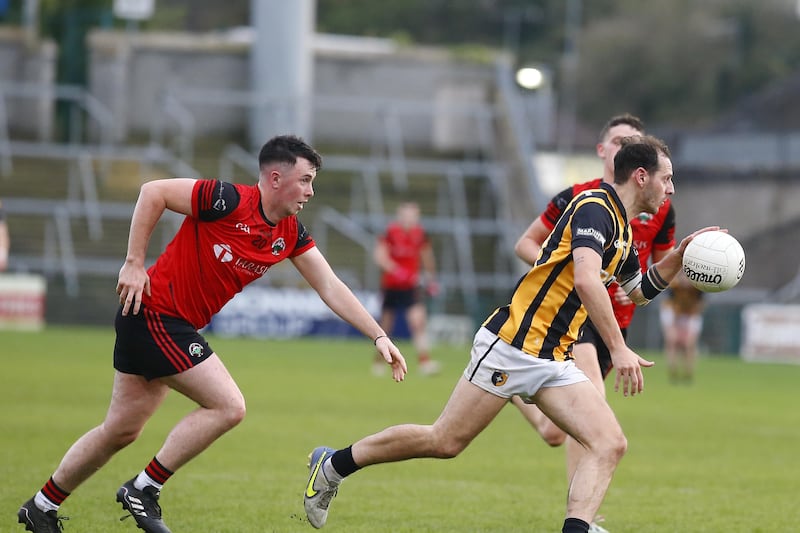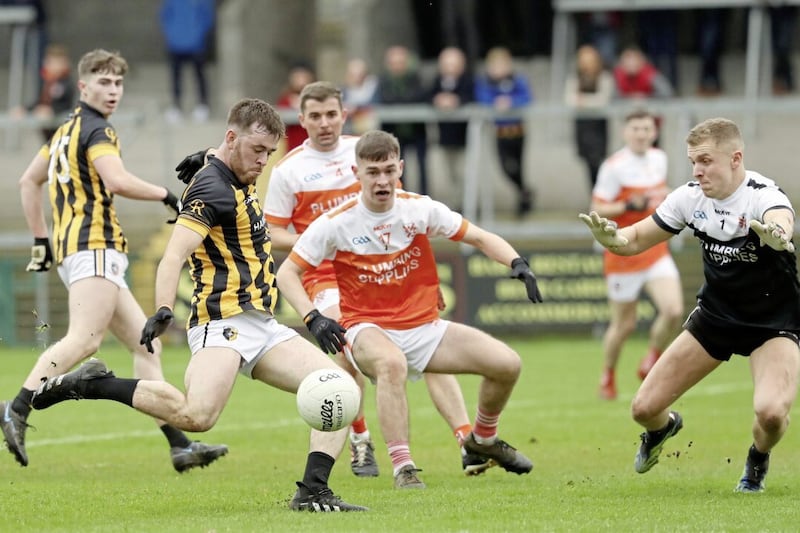Fifty years ago this week – in July 1974 - Peter Makem set out on a journey around Armagh to sign players up for a new system which, for the first time, introduced attention to detail and preparation to the county squad. Since then success has come regularly to the Orchard County and Andy Watters reeled back the years with the former Armagh manager…
SUCCESS comes once in a generation in Armagh. The Orchard County first made their voice heard on the national stage by reaching the 1953 All-Ireland final, then there was ‘77, then 2002 and 2003 and now, right on schedule, 2024.
Silverware hasn’t always been the driving force. At one stage participating was enough and it wasn’t unusual for Armagh County Board to call spectators out of the stands and coax them into pulling on a jersey.
Peter Makem decided to change that. He recruited players and was able to talk Newry-based Derry native Gerry O’Neill (brother of former Celtic and Republic of Ireland manager Martin) into leading them. Success bred success…
O’Neill had also been manager from 1970 until 1972 but he resigned because of what he saw as a lack of co-operation from the county board.
A measure of such disorganisation was that the Armagh side that played Down at Lurgan in the first round of the Ulster Championship in 1974 first met as a team on the day of the match. Some were being contacted on the preceding Friday and Saturday nights to make sure 15 players would turn up!
Armagh weren’t lacking talent. They had some established players on their team at the time. Peter Loughran and Tom McCreesh were Railway Cup players. Paddy Moriarty was an Allstar, Clan na Gael clubmen Jimmy Smyth, Jim McKerr and Colm McKinstry had Ulster Club championship medals and had played in an All-Ireland Club final.
Elsewhere there was an up-and-coming swashbuckler from Crossmaglen called Joe Kernan and Jim Finnegan coming through but there had never been more than a handful of Armagh players at the rare training sessions.
So when Gerry O Neill, who also managed St Colman’s college to Hogan Cup success in 1967, returned in September 1974 he inherited established players but this time he had a panel of up to 25 willing footballers to work with and in a mere three years created an Ulster Championship winning team and reached the All-Ireland final.
Jimmy Smyth, the captain in those formative years, used to say that if Armagh ever rose to prominence they would generate massive support and his words turned out to be true.
Armagh won another Ulster in 1982 (Peter Makem was the manager) and throughout the 1980s, others such as Fr Sean Hegarty, Paddy Moriarty, Joe Kernan, Jim McCorry and John Morrison kept the team in contention for honours, reaching Ulster and National League finals.

HOWEVER, the next golden era came under the dual management of Brian McAlinden and Brian Canavan.
Following the long absence of a major trophy since 1982, the ‘Two Brians’ took over in 1998 and McAlinden imposed his no-nonsense personality on a new generation of Armagh players, eliminating any evidence of slackness or half-heartedness and introducing a strict plan of action.
Under the captaincy of Jarlath Burns, Armagh built a fresh team spirit that re-gained the Ulster crown in 1999 and retained it the following year with a team that provided the bulk of the All-Ireland-winning side of 2002.
Players such as Paul McGrane, John Toal, Kieran McGeeney, Diarmuid Marsden, Oisin McConville, the McNultys (Enda and Justin), McEntees (Tony and John), O’Rourkes (Aidan, Martin and Cathal) and Benny Tierney came very close but inexperience was the factor that saw them narrowly defeated by Kerry and Galway in 2000 and 2001.
Joe Kernan took over in 2002. His experience of winning three All-Ireland club championship titles with Crossmaglen added a new dynamic to the overall set-up, leading to the historic Sam Maguire glory that year. Joe also managed Armagh to four Ulsters and Peter McDonnell got the last out of that team with a seventh in 2008.
A LONG period of decline and transition followed the ‘noughties’. Kieran McGeeney took over from Paul Grimley in 2014 and a fresh generation of players gradually began to appear on the scene.
The path to success would be dominated by trial and error but year after year, despite many disappointments and bad luck, green shoots appeared.
McGeeney has assembled an outstanding panel of players and Armagh produced outstanding Ulster final performances against Derry and Donegal but lost both on penalties only to bounce back with a superb victory over Kerry in this year’s All-Ireland semi-final.
All-Irelands nowadays are won or lost by a point or two and Armagh need a rub of the green for their fifth appearance in an All-Ireland final. Marginal decisions going their way, the break of the ball bouncing into their hands and fresh legs coming in at the right time in the right place.
To have come this far in the third outstanding Armagh era is an immense achievement for all involved in recent years. The end-game can be nothing less than another Sam Maguire.





